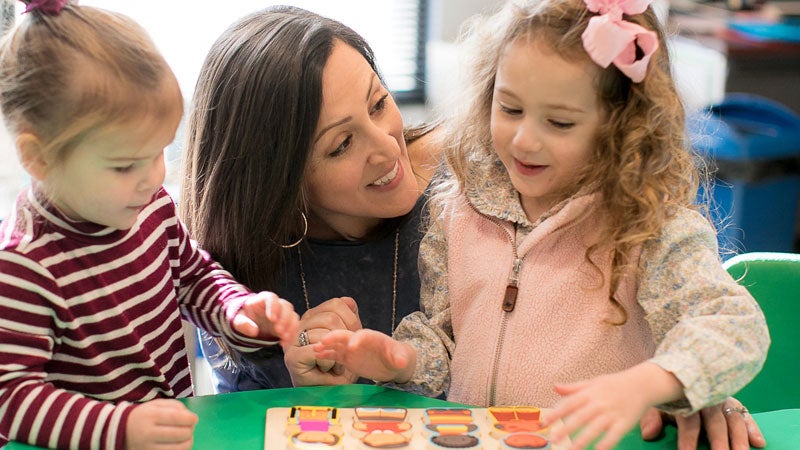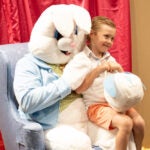At Mitchell’s Place, communication is key. For the past 14 years, teachers there have focused on helping preschoolers to communicate and to request what they need—a combination of classroom education and therapy developed for children affected by Autism Spectrum Disorder. But those same tactics help typically developing children in their classrooms too. Perhaps no one can speak to that dynamic more astutely than Mitchell’s Place therapists who wear another hat too, as mothers of neurotypical children who have benefitted from the programs there.
“It was a wonderful experience for my child,” Education Director Samantha Pate says. “Academically, he was definitely ready for kindergarten, but the emotional and social benefits were most pronounced. He would come to me and say, ‘Mommy, I helped my friend today open his banana.’ It gave him such a sense of accomplishment and pride.”
Developing character and cultivating a sense of acceptance and a desire to help others are perhaps the most crucial results of typical children learning alongside their autistic peers. “Talking about feelings and verbal problem-solving are stressed here, and these are skills that pay benefits for all children,” says Jan Hobbes, a speech language pathologist. “My daughter has learned to advocate for herself,” she says of a skill that might not be stressed as much in other preschool settings.
 Since its inception, the Early Learning Program (ELP), which is the daily preschool program, has included neurotypical children as well as those diagnosed with autism. Because difficulty with communication is one of the key components of autism, strategies to help preschoolers learn to verbalize and increase their ability to communicate with their teachers as well as their peers is a primary focus. Not surprisingly, the techniques used with autistic preschoolers benefit their typical classmates as well.
Since its inception, the Early Learning Program (ELP), which is the daily preschool program, has included neurotypical children as well as those diagnosed with autism. Because difficulty with communication is one of the key components of autism, strategies to help preschoolers learn to verbalize and increase their ability to communicate with their teachers as well as their peers is a primary focus. Not surprisingly, the techniques used with autistic preschoolers benefit their typical classmates as well.
Anne Walker, director of outpatient services and an occupational therapist, says the skills taught and reinforced every day in the preschool classrooms are necessary for all students as they approach kindergarten. “Things like learning how to be in a group, how to sit in a chair, how to wait your turn… These are things every kindergartner is expected to know,” she explains. Samantha agrees: “Classroom routines are huge when you go into kindergarten, and if you don’t have access to a group setting beforehand, you’re going to have to play catch-up.”
Now after seeing how much typically developing children benefitted from the strategies used with their autistic peers, the therapists at Mitchell’s Place have come up with a way to share their expertise with those not on the spectrum who aren’t enrolled in their preschool. The result is two new programs that are available to preschoolers where play and learning go hand-in-hand. Motor Mouths is geared to 2- to 4-year-olds who can independently participate in a small group setting. Mommy and Me Talk Time is for caregivers and children from 12 to 24 months. Both groups focus on communication and social skills under the watchful eyes of trained speech and occupational therapists.
 “The idea for Mommy and Me Talk Time came from conversations outside of work, from parents who had lots of questions for me about language development,” Jan says. “It’s for any parents who might have some minor concerns. They’re not necessarily worried about autism, but many times parents will say things like, ‘She’s 20 months and she’s not really talking.’ They are not sure what they should be expecting. We focus on language development, what to expect, and then tried and true strategies they can try at home to get communication going.”
“The idea for Mommy and Me Talk Time came from conversations outside of work, from parents who had lots of questions for me about language development,” Jan says. “It’s for any parents who might have some minor concerns. They’re not necessarily worried about autism, but many times parents will say things like, ‘She’s 20 months and she’s not really talking.’ They are not sure what they should be expecting. We focus on language development, what to expect, and then tried and true strategies they can try at home to get communication going.”
Take the Pike family for example. Lucy Pike’s older son who is on the autism spectrum attended the Early Learning Program and saw dramatic progress. “Being in such a language-rich, therapeutic environment was amazing for him,” she says. But her younger daughter, who is neurotypical, also received crucial assistance from the Mommy and Me program. Lucy says she noticed that her 2-year-old daughter “seemed to be struggling a bit in the language department.”
But after six weeks in the play group, her language had accelerated. “Lily was only saying a few words before we started and she progressed to 4 to 5 word sentences very quickly. She now regularly communicates what she needs and wants through words.” And, she says, her daughter thoroughly enjoyed the play group because it made learning so much fun.
Anne stresses the learning in it too. “The Mommy and Me program is a great enrichment activity for parents or caregivers to do. Every strategy we talk about in class is something that’s really easy to incorporate into their daily routines,” Anne says. “Early intervention is important, so if a parent is concerned, it can’t hurt to call about it.”
 Mary Margaret Moore echoes Anne’s sentiment. A special education teacher in Mountain Brook Schools’ preschool program and the mom of a typically developing daughter who attends Mitchell’s Place ELP, she would encourage any parent with questions to find out more. “Take a tour!” she says. “Walking through the halls, you will see that it is very much like a typical preschool, but with small class sizes, a high teacher-to-student ratio, and research-based curriculums and practices in place. The teachers and staff are highly trained and they love what they do.”
Mary Margaret Moore echoes Anne’s sentiment. A special education teacher in Mountain Brook Schools’ preschool program and the mom of a typically developing daughter who attends Mitchell’s Place ELP, she would encourage any parent with questions to find out more. “Take a tour!” she says. “Walking through the halls, you will see that it is very much like a typical preschool, but with small class sizes, a high teacher-to-student ratio, and research-based curriculums and practices in place. The teachers and staff are highly trained and they love what they do.”
And that’s just why Mitchell’s Place has become an answer to prayer, not just for families with children on the autism spectrum, but many of their friends and neighbors as well.
If you have questions about your child’s language or social development, the Motor Mouths and Mommy and Me Talk Time programs are available to help. Call Mitchell’s Place at 205-957-0294 or visit mitchells-place.com for more information. Language development is the primary red flag for autism, but the experts at Mitchell’s Place hope these programs will alleviate the concerns of many worried parents and give young children the skills and confidence that will set them up for success in kindergarten.
The Back Story
Mitchell’s Place opened its doors in 2005 on Overton Road, the brainchild of Mountain Brook residents Alan and Nancy Meisler. After their young son was diagnosed with autism, the Meislers soon realized the huge problem facing families in their situation: the few services that were available for intervention and education for autistic children were scattered in different locations, and because of that, coordinating therapy was an almost impossible task. With Mitchell’s Place, expertly trained therapists and educators work together under one roof to maximize the efficiency and effectiveness of autism-related services.











